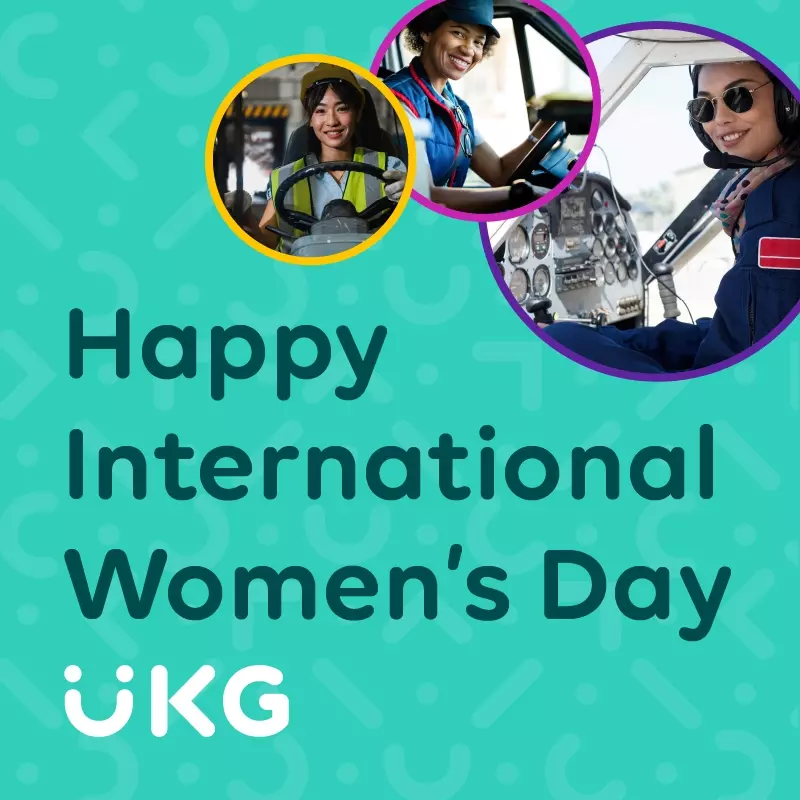
International Women’s Day, March 8th, is all about envisioning a gender-equal world. A world free of bias, stereotypes, and discrimination — where our differences are not just valued but celebrated. This year, the theme for International Women’s Day is #BreakTheBias, a message encouraging inclusive work cultures, free of judgment and discrimination, where women can thrive in their careers and their achievements are recognized.
How many young girls do you know that would say, “truck driver” or “pilot” when asked what they want to be when they grow up? Odds are, not many. Why is that? It may be a ripple effect: while women have made strides in the historically male-dominated transportation industry, specifically in fields like trucking and aviation, female representation still remains limited — meaning less visibility to young girls who might have otherwise sought to explore those fields.
The Women in Trucking Association reports that while only around 10% of women make up the total over-the-road driver population, statistics have shown that female drivers actually outperform their male counterparts: they have lower accident ratios, longer tenure, more overall miles driven per year, and more consistent miles per month.
Women in aviation have played a crucial role in building up the industry, yet there is still very little representation in the cockpit. Only about 6% of airline pilots are women, according to the Federal Aviation Administration. Though the number is low, the industry has seen a 27% increase in women filling airline transport pilot positions since 2009, which is a promising shift.
International Women’s Day is a great time for transportation organizations to start thinking about what more they can do when it comes to closing the gender inequality and pay gap, showing solidarity with the women whose livelihoods are within these industries. In these male-dominated fields, representation and visibility are key to diversifying the industries for the future. Young women today will aspire to be tomorrow’s truck drivers, pilots, and transportation industry executives if they have the right exposure to female role models in these positions.
How your transportation organization can support and inspire women
Decision-makers in transportation must look internally to recognize where they can improve and show support through initiatives aimed at closing the gender equality gaps in the landscape of their workforces. There are lots of ways, big and small, to get started.
Commit to gender equity policies to hire, retain, and promote women. Attracting and retaining women in male-dominated fields like transportation must be a top priority for management and stakeholders. Leaders in your organization should provide clear direction to management when it comes to supporting career progression and encouraging the women on their teams to grow with the organization. Helping newer female employees find more tenured female mentors within the company is also a great way to create learning opportunities and mutually beneficial professional relationships.
Invest in Employee Resource Groups. Employee Resource Groups, commonly known as ERGs, are typically employee-led, voluntary interest groups that aim to foster a more diverse and inclusive workplace culture. These groups create a safe space within the larger workplace environment for people from all walks of life to connect, find common ground, educate themselves and others, and celebrate differences. By creating an ERG centered around women, your organization can provide a space for female employees to engage with one another, allowing them the chance to collaborate with other women, support each other’s career trajectories, and act as advocates for one another.
Fight for more visibility/representation in the industry. One of the best ways to recruit women in transportation is by increasing the visibility of female leaders in the industry. Recently I spoke to Rachel, who is a pilot, and asked her to share her experiences as a woman in aviation. When asked, Rachel said, “The aviation industry still feels mostly male dominated; however, as a woman in aviation I've never felt alone. Starting out as a computer science major, I have gotten used to having mostly men around me in the workplace and only having one or two women in my classes. However, I think I’ve been fortunate. Throughout college and pilot training I can’t recall a time where I was the only woman, I’ve had not only female classmates but also female instructors and supervisors.” Rachel expressed the importance of how networking helps her feel connected to other women in the industry. Facebook groups, such as Female Aviators Sticking Together (FAST), offer a forum to connect, support, and ask questions to other women.
Representation at a high level matters if you want to break down prejudice. For example, the image of a male pilot alongside a female flight attendant has long been the standard. By building up women leaders, your organization can change the perception of this being the norm. A great way to get started is by removing opportunities for bias during the hiring process. Consider requiring training for all employees regarding unconscious gender bias, especially recruiters.
Educate the future workforce. Industry leaders can provide a roadmap for young women who want to pursue careers in transportation. To help the next generation succeed, consider offering options for female employees to participate in community activities and educational opportunities with the future workforce (for example, participation in Girls in Aviation Day activities).
Going back to my conversation with Rachel, I asked her what she would say to young girls whose dream it is to be a pilot. “With anything in life, I always say to try and go for it. If you put your mind to something, anything is doable. And don’t hesitate to reach out to others, there's probably another woman out there who’s trying to do the same thing or has already done it.” Rachel says she is very grateful for her career in aviation and is looking forward to seeing where it goes in the future.
To attract more women to the transportation industry, young girls must know about these career paths to begin with — allowing them to seek out and gain knowledge and hands-on experience to weigh interest in future job opportunities. If more young women see roles in trucking, aviation or other transportation industries as viable options, the gender gap will close, and the bias will diminish.
Ensure pay equity. Pay equity is critical to the success of organizations – especially since the average female employee is earning less than her male counterpart. Your organization can take steps towards closing this pay gap. By ensuring that women are compensated fairly and equitably compared to their male counterparts, your organization will increase morale, retention, and productivity by helping to attract the best employees, reduce turnover, and increase commitment to the organization — especially amongst female employees who know they are being compensated equally.
Ultimately, the most important thing to remember when it comes to exemplifying gender equality is to not let the past dictate the future. Even though aviation, trucking, and other transportation roles have traditionally been male-dominated, women can thrive in these industries with the right level of support and equity from employers.
International Women’s Day celebrates the contributions and achievements of women around the world. How will your organization help #BreakTheBias?

“Pay inequity continues to be a pervasive problem across the world. As an organization whose purpose is people, we know that an individual’s income impacts every aspect of life, including their health, wellness, family, and future. We’re joining the chorus of voices demanding fair pay for all and going a step further by committing funds to encourage meaningful and permanent change to close this wage gap.”
-Brian Reaves, Chief Belonging, Diversity, and Equity Officer at UKG
Learn more about UKG’s commitment to closing the wage gap with pay equity.



